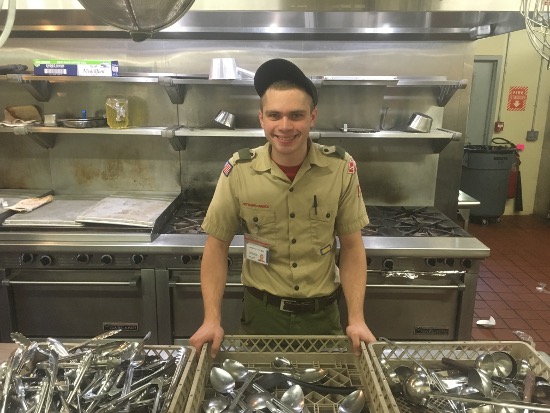Communications of the ACM
A Summer Away From the Keyboard

Credit: Getty Images
As the Spring semester winds down each year, computer science majors either head off to an internship or end up working three months in a non-computer science job. While they may not be improving their programming skills, there are benefits — and some drawbacks — to working in another field.
The U.S. Bureau of Labor Statistics says there were 20.9 million in the youth labor force (ages 16 to 24) in summer 2017. Students in high-demand fields, like computer science, can earn above minimum wage in a summer internship, but some students venture off this path, either by intent or circumstance.
In this context, three computer science students explain the pros and cons of spending their summer away from coding.
Creating Change
Maitreyee Joshi is a senior at Carnegie Mellon University. Despite being heavily involved in student activities and scoring an internship at Microsoft after her sophomore year, she decided to work at Talent Beyond Boundaries after her junior year.
Talent Beyond Boundaries works to connect skilled refugees with employment in their field. The non-profit uses technology to connect refugees to private sector employers, so Joshi was confident her technical background would be an asset.
Joshi learned how technology could have a positive impact while working as a research intern at Stanford University while she was in high school; there, she met Ted (not his given name), who had completed his MBA at Stanford and was CFO of a startup. Then one day, Ted's life changed completely.
"After feeling extremely groggy, Ted took a nap and, when he woke up, he was unable to move a single part of his body," Joshi says. "Ted was diagnosed with a brainstem disorder that would leave him mute and quadriplegic for the rest of his life.
"The sudden onset of this disability frightened me. But as I worked alongside Ted to create a video camera-equipped quadcopter to help him inspect his house without moving, I realized the power of technology to immensely help the disabled."
Inspired by this, Joshi worked on a variety of projects for the disabled, including an algorithm to detect cancerous DNA mutations, an improved prosthetic system with tactile feedback for amputees, and an indoor navigation system for the blind. She founded a company specializing in technology for the disabled. Her interest in using technology to help those in need solidified.

at a non-profit organization in Washington D.C., where she
helped refugees find employment.
She knew the summer of her junior year would be her last opportunity to easily explore interests outside of her major. "After a lot of deliberation, I realized I would regret it down the road if I didn't take the risk now. I decided to turn down all my offers from major tech companies and committed myself to finding an internship related to human rights in the public sector," Joshi says. "I hoped that by going to work at Talent Beyond Boundaries over the summer, instead of taking a computer science internship, I could gain clarity on the best way I could work on creating social change."
While she says the internship was the right decision, she thinks it hurt her job prospects for the immediate future. Recruiters have questioned her extensively about the tech internship offers she received and turned down.
"The primary assumption seems to be that I worked at a non-CS job because I couldn't get a CS job," she says. "Overall, it feels like the CS internship and job process rewards taking the 'conventional' path of working at tech companies, punishing people who take risks. It feels like the name brands matter more than experiences, skills, and passion. Thus, taking a risk this summer definitely diverted me from the path that companies seem to look for and has made the job interviewing process much more difficult."
"I'd like to see a future where young people who clearly have technical talent are rewarded — not penalized — for taking unconventional but more impactful internships," Joshi says. "If I'm in a position of power in the future, I want to help make that happen."
Saving Up
The enormous cost of tuition means some students take whatever summer position they can get. Dustin Cook, a computer science sophomore at the South Dakota School of Mines & Technology (SDSM&T), is from Wyoming, a state that's rife with cowboys and farmland, where computer science opportunities are few and far between.
Cook got an associate's degree from Casper College, WY, and decided to transfer to SDSM&T. He figured he'd have better opportunities at a four-year college, and hoped to join the school's accomplished programming team.
To help fund his move and schooling, he worked the summer in the meat aisle at Walmart. "I applied at a refinery and some other places, but there isn't much for computer science in Wyoming," Cook says.
His average day at Walmart? "I went into the freezer and stared at the ceiling for an hour. Then I would put out some products and go back to staring at the ceiling." The job was mind-numbing, he says.
While he doesn't think the job will hurt his future opportunities, he says he gained nothing from his time there other than a paycheck. "I went to the programming team tryouts and I realized how rusty my programming is," he says. "It would have been nice if I could have gotten a job involving my studies."
Now We're Cooking
Jonathan DiLuglio, a computer science senior at the University of Rhode Island, was involved with the Boy Scouts of America long before he developed an interest in coding. He was an Eagle Scout before turning 18, and worked at the Boy Scout's Camp Yawgoog for six seasons. He started out cleaning tables, and worked his way up to Food Services Director this past summer.
He oversaw the camp's three kitchens, ordered food, and created the menu. His day would start with a delivery, then he'd distribute inventory, and would visit the kitchens to make sure everything was going well. He filled out purchase orders with invoices weekly.

this past summer. In previous camp seasons, he has worked as a cook,
kitchen manager, service director, and dining hall supervisor.
"My summer was definitely rewarding. Working on the menu in the off-season, and putting in time researching and getting things all set for the summer was really exciting," DiLuglio says. "Watching everything fall into place was a gratifying experience. Reviewing comment sheets from the week, people appreciated the thought and work that was put into the menu.".
He learned valuable leadership, communication, and time-management skills while managing the kitchens, DeLuglio says. Plus, he got to help out the organization that helped shape who he is today.
"I didn't look for a computer science internship this summer because I knew it would be possible to have an internship during the school year," he says. "Camp has always been a home to me. That camp provides kids with not only fun for a week, but valuable life skills where they can learn how to swim, take their first-aid merit badge, go climbing on a rock wall, and have an amazing experience. That's what has kept me coming, back year after year."
Kelsey Sinclair is a tech writer based in Rapid City, SD.
No entries found